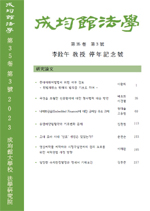중대재해처벌법의 위헌 여부 검토
Constitutional Review of the Serious Accidents Punishment Act
- 성균관대학교 법학연구원
- 성균관법학
- 제35권 제3호
-
2023.091 - 34 (34 pages)
-
DOI : 10.17008/skklr.2023.35.3.001
- 123

그간 수많은 안전사고를 겪어 온 우리 사회는 중대재해를 예방하고 종사자 등의 생명과 신체를 보호하기 위해 2021년 1월 중대재해처벌법을 제정했다. 이 법에 대해서는 지지와 비판이 교차해 왔는데, 특히 그 비판 중에는 이 법이 헌법에 위반된다는 주장들도 있었다. 본 논문은 이 법에 대한 비판적 주장 중에서 특히 위헌론 주장의 당부를 검토하기 위한 목적에서 착안되었다. 위헌론 주장에 대한 검토는 지금까지 형성된 헌법재판소의 법리와 그것이 개별 사례에서 적용되어 온 구체적 판단들을 기초로 수행되었다. 먼저 책임주의와 관련하여, 법정형의 종류와 범위를 정하는 데에는 입법자의 재량이 폭넓게 인정된다. 이 법은 벌금형이 가능하게 되어 있고, 징역형도 1년 이상으로 되어 있어 하한이 과도하게 높지 않아 법관이 죄질의 경중이나 책임, 비난가능성을 살펴서 그에 부합하는 형벌을 정할 수 있도록 하고 있다. 따라서 이 법은 책임과 형벌 간의 비례원칙에 위반되지 않는다. 또한, 이 법의 안전 및 보건 확보의무와 산업안전보건법상 안전 및 보건조치의무는 그 내용과 성격에서 차이가 있으므로, 이 법의 의무위반을 더 중하게 처벌한다고 해서 이것이 반드시 평등원칙에 반하는 불합리한 차별에 해당하는 것은 아니다. 마지막으로, 명확성 원칙이 문제되는데, 이 법이 일정부분 추상적인 내용으로 규율되어 있다 해도 지금껏 헌법재판소가 위헌으로 결정한 법조항들과 비교하면 그 정도로 불명확하다고 보기는 어렵다. 그뿐 아니라 법관의 보충적 해석을 통해 그 의미를 구체화할 수 있는 점, 이 법의 수범자는 일반국민이 아닌 특정 집단으로 한정되어 있는 점도 고려될 필요가 있다. 종합하면, 이 법의 규정들이 위헌이라고 볼 만큼 불명확하지는 않다. 이처럼 이 법에 관하여 제기되는 여러 위헌론이 있지만, 그간 축적된 헌법재판소의 판례에 비추어 검토해 보았을 때 이 법이 합헌성의 경계를 유월해 위헌에 이르렀다고 판단되지는 않는다.
In January 2021, Korean society, which has witnessed numerous safety accidents, enacted the Serious Accident Punishment Act to prevent serious accidents and safeguard the workers’ lives and physical well-being. This legislation has elicited both positive and negative responses, with one of the criticisms being its potential unconstitutionality. The purpose of this paper is to examine the criticisms against the Act, especially the argument of its unconstitutionality. The examination of the unconstitutionality arguments is based on the jurisprudence of the Constitutional Court as it currently stands and the rulings that have been applied in previous cases. First, concerning liability, the legislature’s discretion in determining the type and scope of statutory penalties is broadly acknowledged. The Act allows for fines and imprisonment for no less than one year, and the minimum penalty is not unreasonably high, allowing judges to consider the severity of the offense, responsibility and moral blameworthiness, and to impose an appropriate punishment. Therefore, the Act does not violate the principle of proportionality between responsibility and punishment. Furthermore, the obligation to ensure safety and health under the Act and the obligation to implement safety and health measures under the Occupational Safety and Health Act differ in content and nature. Therefore the more severe penalty for violating the obligation under the Act does not necessarily constitute unreasonable discrimination that violates the principle of equality. Finally, the principle of clarity is at issue, and although the Act is somewhat abstract, it does not appear to be as unclear as the provisions declared by the Constitutional Court as unconstitutional. Additionally, it should be noted that judges can provide supplementary interpretation to clarify the Act’s meaning, and the Act’s perpetrators are limited to a specific group of people rather than the general population. Considering these points together, the Act’s provisions are not unconstitutionally vague. Despite the various constitutional arguments raised against the Act, we do not believe that the Act crosses the line of constitutionality and becomes unconstitutional when reviewed in light of the accumulated precedents of the Constitutional Court.
Ⅰ. 서론
Ⅱ. 책임주의
Ⅲ. 평등원칙
Ⅳ. 명확성 원칙
Ⅴ. 결론
(0)
(0)